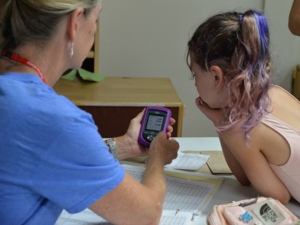Age-Related Guidelines for T1D Responsibilities
Type 1 diabetes involves lifelong, daily management. When a child with type 1 diabetes is young, their parent or caregiver takes on most of the responsibility of the child’s day-to-day care. As the child grows older, he or she is able to become more involved in managing their diabetes and will ultimately become responsible for all aspects of their day-to-day care. Children should be encouraged and supported to gradually assume more responsibility in their diabetes self-care as they mature and demonstrate the confidence and ability to do so.
Different factors play into when a child is able to start taking on more of the day-to-day responsibilities, such as:
- Age of child
- How long it has been since their diagnosis
- Their willingness/interest to take on more responsibility
- Their level of independence
- Their overall understanding of diabetes
General guidelines for recognizing certain diabetes management responsibilities that kids may be able to do for their age.
| 5 years and younger:
Children in this stage rely solely on their parent/caregiver for diabetes management, however there are ways to include them to help encourage and facilitate autonomy at an early age. You can include the child by allowing them to:
|
6-8 years old:
|
9-12 years old:
|
13-18 years old:
|
It’s important to keep in mind that each child is different, and they develop and mature at different rates. A child’s ability to perform self-care tasks depends on their level of maturity, capability, and willingness to assume responsibility of their diabetes management.
How to know if your child has been given the right amount of responsibility:
- They demonstrate an understanding of diabetes
- They are adhering to the diabetes management plan
- They have good blood sugar control
- They do not experience frequent medical complications requiring hospitalization
Transferring diabetes care tasks from adult to child will most likely involve a little trial and error. Remember to keep an open line of communication between you and your child about the division of responsibilities and make adjustments as needed.

